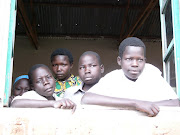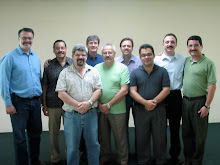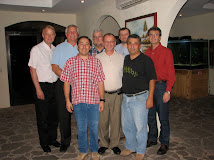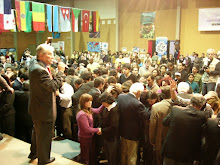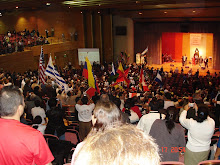Lausanne, Unmasked | By Harold Segura
Harold Segura C. | Chronicles and Reflections from Lausanne IV (5)
Seoul, September 26, 2024
In the auditorium, formality and correctness prevail. In the hallways, on the buses, and in the hotels, there's informality and, at times, theological and political mistakes. It is in these spaces where the unanswered questions and complaints come to the surface.
By the way, the production of the congress program is technically impeccable. Time is kept to the minute; the script is followed as agreed with very few surprises; the more than 1,000 tables where we sit each day remain in perfect rows. Before taking the platform, the speakers pass through a small makeup room where their image is retouched, and their faces adorned (they would have had a lot of work with me). A curious detail: one of today's moderators, it seems, was given a lipstick of a more intense red than is usually applied to a man, especially in an evangelical environment (a bit of humor doesn’t hurt).
So much order in the room might lead to think that there is uniformity in the group; that evangelical theologies have aligned with the rather conservative expectations of those who organized the congress. But that’s not the case. In informal moments, freedom arises, and differences become evident.
One of the controversies that remains is the draft (nobody yet knows if it’s a draft or the final version) of the Seoul Statement. A group of almost 65 theologians, committed to Integral Mission, led by Koreans Sam Cho and Jongho Kim, signed a letter addressed to the Lausanne Theological Working Group. They expressed serious concerns about the lack of transparency in the drafting process. They claim that many participants saw the declaration for the first time when the congress began, with no opportunity to offer suggestions.
This group argues that the declaration needs a stronger prophetic voice and a broader focus on social, economic, and environmental issues, especially in the post COVID-19 context. They also point out an imbalance in the treatment of LGBTQ+ issues, with a disproportionate emphasis compared to other urgent concerns such as racial justice and economic inequality. They recommend that the church should engage not only in evangelism and pastoral care but also in the transformation of unjust structures and the care of creation.
Furthermore, the group criticizes the declaration for being overly focused on traditional local churches, ignoring new expressions of faith, such as digital communities and para-church organizations. They suggest addressing the arms industry, racism, patriarchy, and Christian nationalism, which distort the gospel and harm the church’s testimony. They also lament the omission of a clearer condemnation of faulty theological justifications in the Gaza conflict. For them, the declaration lacks the dynamism needed to inspire a vibrant and appealing movement. They believe the church should be a catalyst for change, not only in the spiritual realm but also in social justice and equality, responding to the concerns of younger generations like Generation Z.
They invited other participants who agreed with them to sign the document. I gladly signed it. Dozens more did as well, although, to be honest, the majority have not, and will not (nor do they know of the existence of this petition).
This is, the global evangelical community: diverse, though nostalgic for archaic theologies. Today, it is obsessed with moral debates and, because of this, trapped by political partisanships. This is the faith of the people to whom I belong and to whom I owe myself. This is how it is; unmasked.
What happens outside the Lausanne IV program can sometimes be more interesting than what takes place within the convention center. I'm not saying that the conferences, testimonies, platform interviews, music, or the small group discussions aren’t valuable, but rather that outside the formal agenda, in the freedom of the hallways, controversies that reveal the theological and pastoral tensions among those of us here emerge.
In the auditorium, formality and correctness prevail. In the hallways, on the buses, and in the hotels, there's informality and, at times, theological and political mistakes. It is in these spaces where the unanswered questions and complaints come to the surface.
By the way, the production of the congress program is technically impeccable. Time is kept to the minute; the script is followed as agreed with very few surprises; the more than 1,000 tables where we sit each day remain in perfect rows. Before taking the platform, the speakers pass through a small makeup room where their image is retouched, and their faces adorned (they would have had a lot of work with me). A curious detail: one of today's moderators, it seems, was given a lipstick of a more intense red than is usually applied to a man, especially in an evangelical environment (a bit of humor doesn’t hurt).
So much order in the room might lead to think that there is uniformity in the group; that evangelical theologies have aligned with the rather conservative expectations of those who organized the congress. But that’s not the case. In informal moments, freedom arises, and differences become evident.
One of the controversies that remains is the draft (nobody yet knows if it’s a draft or the final version) of the Seoul Statement. A group of almost 65 theologians, committed to Integral Mission, led by Koreans Sam Cho and Jongho Kim, signed a letter addressed to the Lausanne Theological Working Group. They expressed serious concerns about the lack of transparency in the drafting process. They claim that many participants saw the declaration for the first time when the congress began, with no opportunity to offer suggestions.
This group argues that the declaration needs a stronger prophetic voice and a broader focus on social, economic, and environmental issues, especially in the post COVID-19 context. They also point out an imbalance in the treatment of LGBTQ+ issues, with a disproportionate emphasis compared to other urgent concerns such as racial justice and economic inequality. They recommend that the church should engage not only in evangelism and pastoral care but also in the transformation of unjust structures and the care of creation.
Furthermore, the group criticizes the declaration for being overly focused on traditional local churches, ignoring new expressions of faith, such as digital communities and para-church organizations. They suggest addressing the arms industry, racism, patriarchy, and Christian nationalism, which distort the gospel and harm the church’s testimony. They also lament the omission of a clearer condemnation of faulty theological justifications in the Gaza conflict. For them, the declaration lacks the dynamism needed to inspire a vibrant and appealing movement. They believe the church should be a catalyst for change, not only in the spiritual realm but also in social justice and equality, responding to the concerns of younger generations like Generation Z.
They invited other participants who agreed with them to sign the document. I gladly signed it. Dozens more did as well, although, to be honest, the majority have not, and will not (nor do they know of the existence of this petition).
This is, the global evangelical community: diverse, though nostalgic for archaic theologies. Today, it is obsessed with moral debates and, because of this, trapped by political partisanships. This is the faith of the people to whom I belong and to whom I owe myself. This is how it is; unmasked.
About the author:
 Pastor and theologian Harold Segura is Colombian, currently residing in Costa Rica. He is the Director of Faith and Development for World Vision in Latin America and the Caribbean and the author of several books. Previously, he served as Rector of the International Baptist Theological Seminary in Colombia.
Pastor and theologian Harold Segura is Colombian, currently residing in Costa Rica. He is the Director of Faith and Development for World Vision in Latin America and the Caribbean and the author of several books. Previously, he served as Rector of the International Baptist Theological Seminary in Colombia.
















